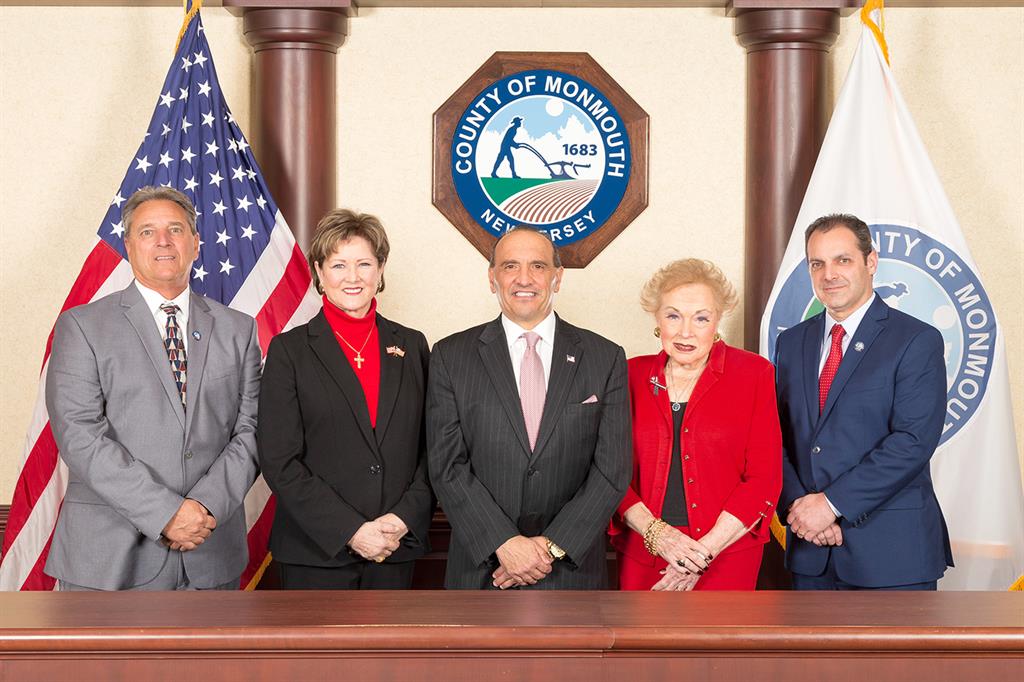Community Planning Perspectives
Planning resilent communities in New Jersey
New Jersey’s system of naming county legislators’ “freeholders” is unique in the United States. The origin of the term was in the provisions of the New Jersey State Constitution of 1776, which stated:
That all inhabitants of this Colony, of full age, who are worth fifty pounds proclamation money, clear estate in the same, and have resided within the county in which they claim a vote for twelve months immediately preceding the election, shall be entitled to vote for Representatives in Council and Assembly; and also for all other public officers, that shall be elected by the people of the county at large.
The name “freeholder” in the “Board of Chosen Freeholders” is because “clear estate” is also known as a freehold. “Chosen” means elected.

(From left to right) Freeholder Patrick Impreveduto, Freeholder Deputy Director Susan M. Kiley,
Freeholder Director Thomas A. Arnone, Freeholder Lillian G. Burry and Freeholder Nick DiRocco
Monmouth County is governed by five Freeholders elected at-large for three year terms. Each January, the Freeholders select one of their members to serve as the director of the board for the year to preside over the meetings and activities of the board.
The Board is empowered with a broad scope of authority, some of which is designated to them by the State of New Jersey. Its diverse and important responsibilities include both legislative and executive functions including the oversight and regulation of county property and finances. This includes the upkeep of 1000 miles of county roads and nearly 900 bridges, maintenance of more than 16,000 acres of county park lands, providing the largest circulating library system in the state, and maintaining a AAA bond rating.
Generally, the Freeholder Board’s duties include:
• Preparing and adopting the County budget.
• Authorizing expenditures and bonds.
• Appointing county officials and members to boards, commissions, and authorities.
• Supervising the administration of county government.
The annual budget covers the cost of maintaining 1,000 lane miles of roads, more than 900 bridges, 16,000 acres of County parks, emergency management services, 911 emergency communications, law enforcement through the Prosecutor’s and Sheriff’s offices, elections, deed recording and passport services in the County Clerk’s Office, probates and adoptions through the Surrogate’s office as well as numerous additional programs and benefits.
Copies of the County budget are available on the Monmouth County website at www.visitmonmouth.com
NOTE: The information provided on this page was taken from Monmouth County Board of Chosen Freeholders website.
Now that we have a technical understanding of what the Board of Freeholders are responsible for. I must ask the question of how well they are doing their job. So what should County government or in fact any form of government do?. In my opinion they should
value, respect, and support all individuals by being inclusive;
become a partner with all communities to ensure a thriving healthy life for their current and future citizens;
create a supportive, positive environment to ensure accountability, responsiveness, efficiency, and justice;
listen to and provide opportunities for all community members to actively collaborate and engage with government
Commit to environmental, social, and economic sustainability and build partnerships to help make the broader community more sustainable;
Meet the challenge of leading with innovation, collaboration, and creativity;
Plan for the future and forge strong partnerships that adapt to meet challenges and manage community impacts.
Meet these expectations then you have good government. Governance is not easy, nor should it be.
“Governments, if they endure, always tend increasingly toward aristocratic forms. No government in history has been known to evade this pattern. And as the aristocracy develops, government tends more and more to act exclusively in the interests of the ruling class - whether that class be hereditary royalty, oligarchs of financial empires, or entrenched bureaucracy."
Frank Herbert